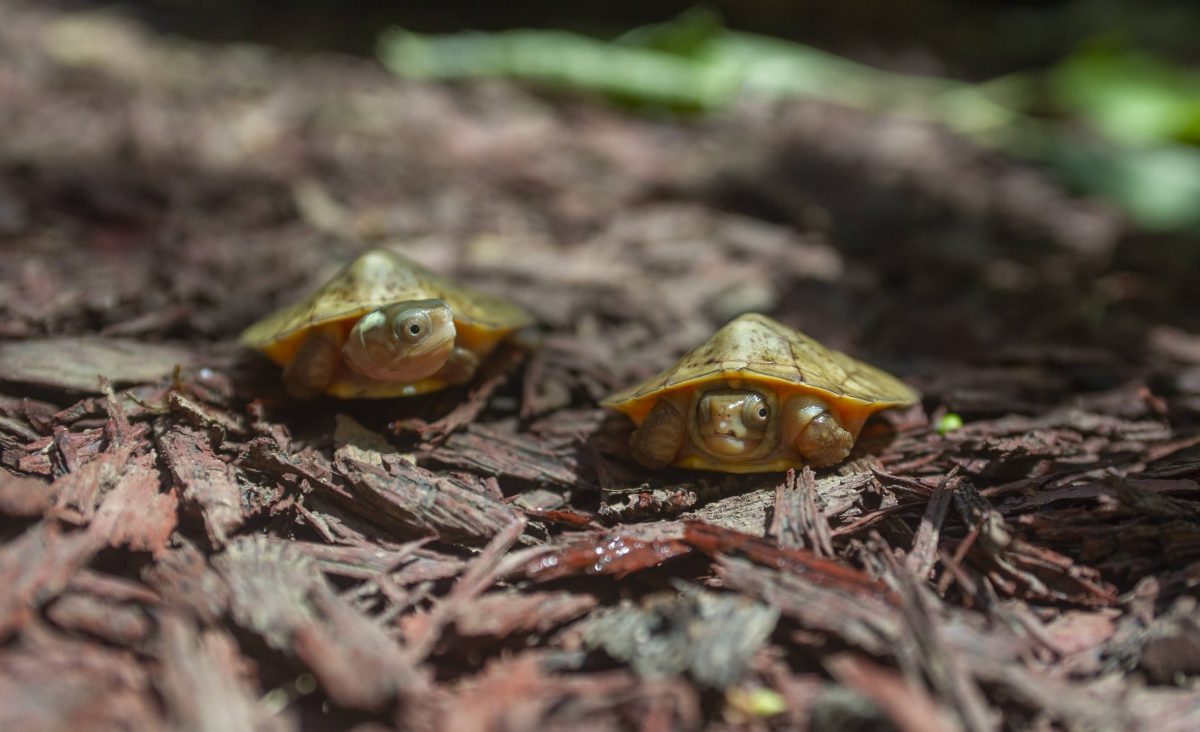Chattanooga, Tenn. (Aug. 4, 2020) – The Tennessee Aquarium has some espe-shell-y good news to announce. Between late June and early July, Aquarium herpetologists successfully hatched seven adorable baby turtles belonging to two imperiled Southeast Asian species.
Five of the minuscule, surprisingly nimble babies are Four-eyed Turtles (Sacalia quadriocellata), an endangered species found only in the streams and ponds of a remote region of extreme southeastern China. The last two hatchlings are Beal’s Four-eyed Turtles (Sacalia bealei), a closely related — and critically endangered — species with an even smaller range. Both species are named for the distinctive “eyespot” patterns on the top of their heads.
In 2007, the Aquarium made national headlines for successfully hatching a Beal’s Four-eyed Turtle. At the time, only 18 Beal’s were being cared for by zoological facilities. Including this most-recent pair, the Aquarium has now hatched another 18 of these critically endangered turtles, doubling the 2007 count for the entire population in human care.

Successfully hatching these species results from a steady hand and a tremendous amount of trial and error. In general, turtles tend to be slow-to-mature. These particular species lay eggs infrequently, which makes it difficult to determine the ideal nesting conditions, says Senior Herpetologist Bill Hughes.
“You only get one clutch a year, and you don’t get many eggs,” he says. “Every year, you get one shot to get it right and then it’s done until next year. That’s challenging.”
Since hatching the first Beal’s more than a decade ago, Hughes has made only minor adjustments to environmental factors such as the size and ambient temperature of the habitat in which the turtles reside. Even slight alterations to seemingly unimportant factors could tank an entire year’s nesting season, he explains.
“I’m doing something that works. I don’t want to change too many parameters and find out that I messed it up,” Hughes says. “There’s something to be said for consistency. They’re comfortable.”
This year’s batch of five Four-eyed Turtle hatchlings is a tremendous boon for the species. Some years, the Aquarium may only hatch one or two Four-eyed Turtles, but larger groups aren’t unheard of. A record group of seven hatched in 2012, but with this crop of hatchlings, 2020 is tied as the Aquariums second-most-successful year for Four-eyed Turtles.
Nationwide, Four-eyed Turtles are only cared for in a handful of institutions, many of which received juvenile turtles that originally hatched in Chattanooga. Similarly, Beal’s are only cared for by one other institution, the Knoxville Zoo, which received its Beal’s from the Aquarium. Sending animals to other facilities bolsters the overall health of the population in human care and opens up new resources for additional breeding in the future.
With seven new hatchlings to care for in addition to overseeing North America’s largest population of turtles in human care, Hughes has his hands full. Nevertheless, he’s quick to point out that these endangered juveniles have been the silver lining on a black cloud of a year.
“Hatching seven of these turtles is a good thing, in general,” Hughes says. “Somehow, though, hatching seven this year, when so many other things seem to be going in the wrong direction, seems even better than normal.
“At this point, any kind of triumph, even a little tiny one, feels like a major triumph because everything else is going so badly.”
Visitors to the Tennessee Aquarium can see button-cute examples of Four-eyed and Beal’s Four-eyed Turtle in the hatchling nursery of the all-new Turtles of the World gallery.
The Tennessee Aquarium has designated 2020 as “The Year of the Turtle” to raise awareness of these amazing creatures’ conservation needs.
More than half of the world’s 356 turtle species are in danger of extinction thanks to habitat loss and illegal trafficking for pets, food and medicinal use.
In addition to hatching and rearing endangered turtles, the Aquarium launched a new conservation program in February. The AZA SAFE American Turtles program harnesses nearly 50 partners’ collective power to address the illegal trade of turtles in the United States.
More information about Four-eyed Turtles can be found at tnaqua.org/animal/four-eyed-turtle/